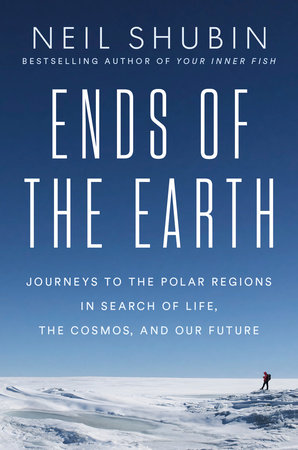**One of the Economist‘s Best Books of 2025**
“In this comprehensive yet concise history of modern polar exploration, Shubin, a professor of evolutionary biology, mixes urgent scientific findings about glaciers and sea-level rise with prescient geopolitical histories of Arctic territorial disputes. Throughout, Shubin relates stories from his own field expeditions: a pilot lands a propeller plane in an icy valley; a crew member stumbles on kaleidoscopic hues of blue while spelunking in Antarctic crevasses; Shubin’s team discovers a field of dinosaur footprints that had been miraculously preserved under layers of ice. Such descriptions enliven the book, and capture Shubin’s reverence for both the beauty and the mysteries hidden in the cold, barren tundra.”
—The New Yorker
“A truly remarkable and readable chronicle that skillfully interweaves travel writing and history in an account brimming with surprising and wonderful scientific discoveries. Written with infectious enthusiasm and irresistible curiosity, this book is a surprisingly fast read that most people will not be able put down until they’ve finished it… Highly recommended.”
—Forbes
“Paleontologist Neil Shubin’s Ends of the Earth offers readers a comprehensive overview of the geology, oceanography, glaciology, geopolitics, and climatology of the planet’s polar regions: Antarctica and the Arctic. Shubin writes clearly and understandably about various complex topics, incorporating stories about his own fieldwork experiences in these places and arguing that polar science offers a “lens to see the natural world and the extraordinary ways we have come to know it.””
—Science
“[Shubin] shows us why fieldwork is essential to understanding our world—and to planning for our collective future as a species… Ends of the Earth is a love letter to ice—to the terrible beauty of its vast, austere expanses; to the blue cathedrals of its deep crevasses; to the resilient plants and animals that have created otherworldly oases in its lee; to the ways it tests human ingenuity and endurance.”
—Los Angeles Review of Books
“Written with infectious enthusiasm and irresistible curiosity, Ends of the Earth blends travel writing, science, and history in a book brimming with surprising and wonderful discoveries.”
—Daily Kos
“Lively accounts of polar science from the earliest days until now. Locked within the polar ice are revelations about the deep past of the Earth and its climate, offering predictions about its future… Shubin writes well about how such discoveries have been made: a lay reader can enjoy the thrill of discovery without enduring the harsh conditions.”
—The New Statesman
“A book with admirable breadth, and one that will leave you in no doubt of the importance of the polar regions—and of the urgency of action if we wish to preserve the treasures they hold.”
—Times Literary Supplement
“Shubin brings the polar world to life through a combination of travel and immersive science writing…. As Shubin demonstrates in Ends of the Earth, the stark polar regions present extreme challenges not only to humans, but to all living things. Yet, through adaptation, life finds a way.”
—Undark Magazine
“In Ends of the Earth, [Shubin] invites us to consider what is ice other than an annoyance glazing our driveways. The answers are more complex than we might think.”
—The Hippo
“This was such a thrilling ride of a book and at times felt reminiscent of a classic Jules Verne adventure. From witnessing the beauty of the polar landscapes to uncovering a field of dinosaur footprints preserved in ice, Shubin takes the reader on a journey from pole to pole as he meets incredible scientists working to better understand these extreme climates. Through his compelling narrative voice and accessible writing style, he takes a complex and urgent topic of climate change and makes it less intimidating. This book is a reminder of how incredibly ‘cool’ our planet can be, and how we must fight to protect it.”
—Nick Mohammed, judge for Royal Society Trivedi Science Book Prize 2025
“In the hands of an expert storyteller and brilliant biologist, the topics of ice and the polar regions becomes a fast-moving, fascinating book that combines travelogue and natural science discovery. From encountering the arctic wooly bear caterpillars and hearty tardigrades to polar fish that manufacture their own ‘anti-freeze,’ I found Ends of the Earth to be a delightful and compelling read.”
—Dr. Daniel J. Levitin, New York Times bestselling author of I Heard There Was a Secret Chord and Successful Aging
“Ends of the Earth is a gripping tale of polar exploration, from a scientist and science writer of the highest caliber. A veteran of fossil-hunting expeditions at both poles, Neil Shubin writes with such warmth about an icy subject. Come for the adventure but stay for the science, as Shubin’s captivating storytelling will give you a new appreciation for some of the harshest and most mysterious places on Earth.”
—Steve Brusatte, University of Edinburgh paleontologist and New York Times bestselling author of The Rise and Fall of the Dinosaurs
“What a remarkable planet we live on—wildest at its cold and lovely poles. This compelling volume should summon us to defend that cold, the vital task for our time on earth.”
—Bill McKibben, New York Times bestselling author of The End of Nature
“For me, as a theoretical physicist who works at his desk with coffee always nearby, Neil Shubin’s brand of science is exhilarating, scary, and a bit alien. But adventuring to forbidding climes teaches us amazing things about our Earth and life on it. We’re fortunate to have such a gifted writer on the scene to bring back these stories.”
—Sean Carroll, New York Times bestselling author of Quanta and Fields
“Ends of the Earth is a cosmic adventure story written in ice. It’s a tale of glaciers that flow like rivers and scientists who fall through crevasses and animals that evolve their own anti-freeze to allow them to thrive in extreme cold. Shubin brings alive some of the harshest and most fragile places on Earth, revealing the exquisite dance of time and physics and biology that created these icy realms and all the creatures that inhabit them, as well as the perils these regions now face in our rapidly-warming world. In the ice, Shubin has discovered the story of our time.”
—Jeff Goodell, New York Times bestselling author of The Heat Will Kill You First
“Dive into the wonders of the polar regions and explore the connections between our planet, the cosmos, and the future.”
—PBS Books and Booklist‘s Early 2025 Must Reads
“Enlightening and often, well, chilling, Shubin’s evaluation of the polar world masterfully merges discovery, appreciation, and concern.”
—Booklist, starred review
“In this dazzling report, Shubin, a biology professor at the University of Chicago, examines what the Earth’s poles reveal about the planet and the universe… Shubin offers hair-raising accounts of his own polar voyages… This enlightens and amazes.”
—Publishers Weekly, starred review
“The world offers two vast laboratories: the Arctic, most specifically Greenland, and the Antarctic… There are plenty of surprises to discover in both places [in this] accessible, nontechnical narrative.”
—Kirkus














